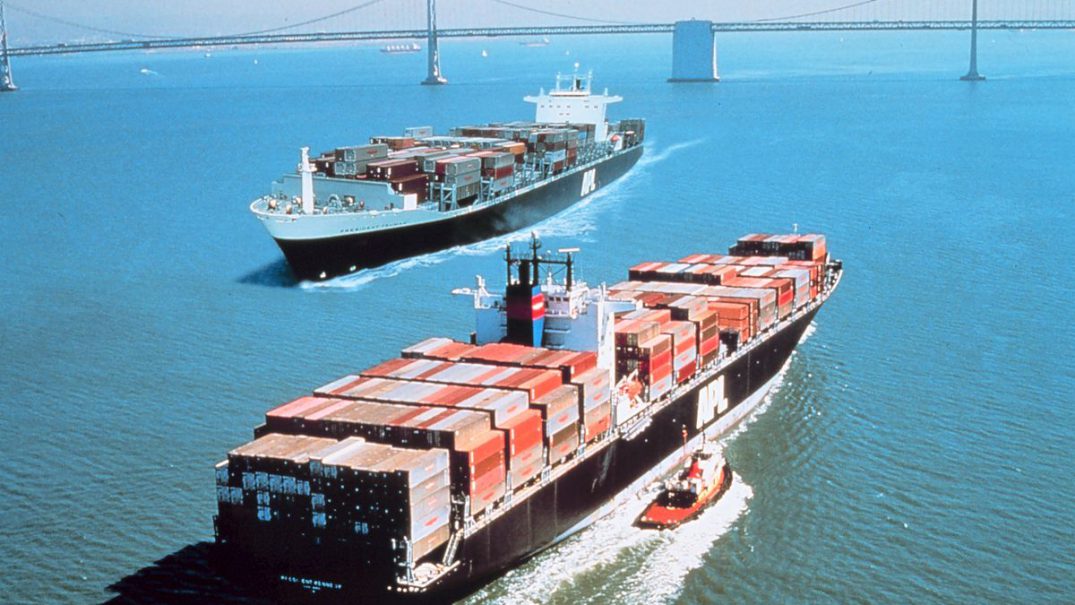Can Brexit be a catalyst for change?

Container ships, by NOAA – California Publication of the National Oceanic & Atmospheric Administration (NOAA), USA
Brexit raises fundamental questions not only for the UK but also for the EU and it is far from obvious that either the British or the leaders of the EU have grasped this fact. The government of the UK has demonstrated a total incapacity to understand the threat that Brexit poses for the economy and seems to think that it can muddle through despite the risk of the economy unravelling and with it the political union. The government says that it will not only withdraw from the EU but also from the single market despite opposition from almost all of the business sector in the UK.
Mrs May seems to believe that developing closer relationships with the USA – in the guise of a closer alliance with President Trump – is the best option for the UK. This is despite the evidence that the US is entirely ruthless in pursuit of its own objectives. Mr Trump has already announced that NAFTA is a dead treaty and that production by US companies in Mexico should be relocated back to the US irrespective of the effects on employment in Mexico, or the higher cost of imported as well as domestically produced goods in the US.
It is worth also recalling that when Britain desperately needed economic assistance in the Second World War that the US insisted that it sell all of its external assets which were then acquired by the US at knock-down prices. Not surprisingly in the years after 1945 the UK experienced extreme economic adjustment precisely because of the forced liquidation of overseas investments during the war. In the famous book by Servan-Schreiber [1967] the US was described as ‘le defi americain’, and the European Economic Community was seen then as a necessary counterweight to US economic imperialism.
By the 1960s the UK had run out of all its trade options – the Commonwealth no longer offered market growth for UK exports and indeed those goods that the Commonwealth imported were no longer products for which global markets were growing rapidly. The attempt to find markets through the European Free Trade Area proved illusory and by the time Macmillan was in office [the early 1960s] it was clear that Britain’s trading future lay with the EEC [precursor of the EU]. So the UK has been a member of the EEC/EU since 1973 and has gained enormously from access to a large and growing market such that today over40% of its exports go to Europe. The contribution to GDP from membership of the EU is hard to measure but is estimated to be of the order of 10%. due to economies of scale in production, greater competition and access to markets with higher levels of demand growth.
Any review of recent trade developments provides two important conclusions. Firstly, leaving the EU and the single market which is the policy of the May government would entail enormous and avoidable costs. The presumption that there are accessible markets out there for UK exporters to tap – and alternative sources of imports – is simply unfounded. Secondly, after almost 50 years as members of the EU the UK has developed patterns of production (and of consumption) that will take many years – and be extremely costly – to adjust. Systems of production have developed which depend on linkeages between countries such that the UK will need to find alternative non-EU suppliers for many inputs, and will also face the common external EU tariff in respect of its exports. There are also bound to be very negative impacts on both direct and portfolio investment by foreigners in the UK.
In an internal memo of JP Morgan their chief economist stated that, ‘much of the plumbing that affects trade in goods and services on a day to day basis would be left without defined administrative process and legal foundations. The importance of tariffs is almost a sideshow relative to these issues’ (November 2016). He also concluded that Brexit was extremely dangerous for UK jobs and that any treaty with the EU was unlikely before 2019.
Britain is of course still a member of the EU and is likely to be so for at least a couple of years – and probably considerably longer (the previous UK ambassador to the EU estimated it would take 10 years to complete the negotiations). This being the case the UK does not have the legal authority to negotiate new trade treaties with third countries although clearly it can hold informal discussions with potential partners. What is clear is that the UK does not have the experienced professionals to engage in the process of trade negotiations and it’s unclear where this expertise is to come from.
What we do know from experience of past negotiations is that the US is extremely tough and pursues its domestic interests relentlessly. So any negotiations on trade with the US will have to face extremely difficult issues such as those relating to animal welfare, GM commodities and products, access to US markets for agricultural products (and the heavy subsidisation of US production) and legal and other protections for US corporations. Concerns about the latter have figured heavily in recent trade discussions between the US and the EU where there is general dismay about the rights that have been demanded for US corporations with potential to sue for financial damages where US companies have been supposedly affected by national policies, eg on health, GM products and so on.
Reducing immigration is primary ?
But irrespective of the evidence the British government still says that all that matters is reducing immigration and everything else is secondary. That this is best achieved through withdrawing from the EU and the single market despite the impact on society and the economy. It is as if the government cannot understand that the British economy has over many years become dependent on the human capital embodied in the flows of labour from the EU and elsewhere in the world. This high level of dependence on immigrant labour across all sectors reflects the dismal failure of all governments who were not prepared to invest in education and skills so as to meet labour needs.
At the present time around 15% of the active labour force is composed of immigrants and key economic sectors such as health, education, construction, transport, social care, agriculture, banking and finance and tourism could not function without their contribution. Overall their contribution to net output and to fiscal receipts are such that both the Office of Budget Responsibility and the Institute of Fiscal Studies have warned of significant effects on the fiscal balance and on economic growth were there to be any major reduction in the contribution of immigrants to national output.
But let’s assume that the British government is determined to leave the EU and the single market primarily in order to be able to control immigration, despite its importance to the economy and to the fiscal position of the country. How it will replace the labour that is currently provided by immigrants is unclear given that the capacity to generate from domestic sources the necessary skilled and highly educated labour does not exist. For many years the British economy has depended on drawing down the investment in skills etc of other countries because it has not been prepared to develop the domestic capacity, ie. it has not been willing to find the resources to invest in training and education.
Developing that capacity will itself take years to achieve given that the capacity would have to be established or at least greatly expanded before there was any flow of trained and educated workers. This is a long term project and would be costly and there would be ongoing dependence on immigrant labour for many years to come. Among the many steps that the government could take now if it seriously wanted to reduce dependence on immigrant labour are to stop cutting education budgets, restore the funding of Further Education Colleges and bring back the Education Maintenance Allowance – all of which assist nationals in acquiring the education and skills that are desperately needed.
What is surprising is that not only does the May government not understand these issues but that the leadership of the EU made such feeble efforts to address the looming crisis prior to the in/out referendum in June 2016. It was not helpful then and not now to reiterate the mantra that free movement of labour is central to the functioning of the single market and that UK cannot be permitted a derogation from it. Whereas it would be much more sensible to accept that countries facing unstable labour markets characterised by precarious employment conditions and falling real wages should have the ability to manage labour flows whether from within the EU or globally.
These labour market conditions are not confined to the UK and other countries are interested in greater control over flows of labour, and in particular the abolition of the posted workers directive which permits employers to undercut locally negotiated wages including minimum wage laws. There is nothing to prevent the UK now from developing policies and programmes that re-structure labour markets with the objective of raising wages and ensuring that employment opportunities in low wage sectors are largely confined to UK nationals. Administrative action is possible through the system of national insurance numbers to restrict the flows of migrant labour into low wage jobs. This does not mean that the existing 3.2 million EU citizens currently in the UK would lose their employment and the government needs to state clearly that their employment rights are protected.
Reforms for all EU members
Here we come to the crux of the problems facing the EU. It is surely of relatively minor importance to allow members the freedom to manage labour flows than to risk the further destabilisation of the Union and possible exits by other countries. Not only will the UK experience social and economic costs as a result of Brexit but so also will other members of the EU. These avoidable costs arise from loss of market access for goods and services, reduced contributions from the UK to the EU budget, greater costs in accessing the financial markets located in London and restrictions on access to the UK labour market for EU citizens.
What Brexit brings to the fore are the real issues confronting the EU which are the relevance of the original principles in its establishment and subsequent policy developments, especially the Euro, for its ability to function and survive in a rapidly changing world.
It may be useful to list some of the EU’s achievements:
- It has established a single market for goods and services and although there are still uncompetitive practices, especially in services, the opening of national markets has raised output and incomes across the Union.
- It has during the past several decades successfully expanded to a membership of 28 countries (as against the original 6) and integrated many of the countries formerly part of the Soviet system with great success.
- It has through the linking of economic and social systems across many countries strengthened the forces of internationalism in many ways, and established mechanisms for conflict avoidance/resolution such that the countries of Western Europe have had 70 years of peace. Aided and assisted of course by NATO.
- It has supported rapid transitions to higher levels of output and employment in many countries through infrastructure investment, technology transfer, and institutional development, not only in countries that have recently joined but in Spain, Portugal, and Italy among others.
These are important achievements and it is important not to sacrifice them through ill thought out reforms. There are of course negatives as well. These include the establishment of the Euro as a monetary arrangement without a fiscal union such that in recent years rather than economic stability and competitive convergence countries have diverged in terms of output and income, and many have as a consequence experienced severe social and economic distress. This was and still is avoidable through reform of the Euro provided there is leadership especially from Germany as the strongest country in the Union.
What seems evident is that the EU is lacking in any strategic leadership. The Commission President seems to see his role as ensuring that nothing is effectively done on tax havens and on the taxation of large multi-national companies. This is a role which he developed when in office in Luxembourg and it seems only too clear that the Commission as a whole has been largely captured by lobbyists. There is no strategic leadership from Germany (and France) and nothing useful can be expected from the European Parliament. That the EU suffers from a democratic deficit is recognised by everyone, and this is another area for urgent reform.
So the key objectives of the EU have largely been achieved and many countries have benefited from the freedom of trade between member countries. The euro as a monetary arrangement needs urgent reform as also does the system of support for agriculture. Not least, the EU needs to do something effective about tax havens and ensure that global companies such as Google and Apple pay appropriate taxes. The role of the European Parliament needs to be revisited with the aim of building effective democratic institutions. Common policies need to be strengthened especially in the areas of climate change and the environment.
The Union has proved more or less totally unable to deal with the problem of refugees fleeing conflict in the Middle East and yet this problem is only going to intensify. Many countries in Africa have growing and youthful populations, high levels of unemployment, often tyrannical regimes and are already experiencing the impact of climate change such that large numbers of people are going to try to migrate into Europe. There is no evidence that the EU understands this threat nor that it has policies in place to meet the challenge. This despite the fact that refugees are already a major issue in some countries, such as Hungary and Poland, contributing to the rise of right wing parties in many EU countries.
The role of lobbyists needs to be addressed and systems developed to ensure a much wider representation of citizen interests and concerns. In part the achievement of these reforms depends on new and committed leadership in the Commission and this will not be achieved under those currently leading the organisation. The existing relationship between the Commission and the Council of Ministers, where the real decisions are taken, needs to be re-visited such that the Commission is strengthened and made more effective.
What is not essential to the functioning of the EU is the total freedom of movement of labour, and systems need to be created that permit members to manage labour flows in collaboration with the Commission. If this reform is introduced with speed then perhaps the current problems created by Brexit will disappear or at least be sufficiently ameliorated that the UK would be able to continue as part of the Union in some form. A possibility – even if not a certainty but preferable to continuing on the present disastrous trajectory.
The last thing the EU needs is a low tax offshore haven on its doorstep which also undercuts working conditions in the EU through derogation from established standards by a British government facing uncontrollable problems caused by Brexit. Yet this is something that the UK has threatened if a productive trade deal is not negotiated. The British government seems prepared to further destabilise its own fiscal situation by cutting corporate taxes and thus adding to the budgetary problems generated by falling output, rising unemployment and any reduction in migrants.
Who would lose most from such behaviour is fairly obvious, and making unrealistic threats does not seem a sensible basis on which to negotiate with our partners in the EU.
The threat by the British government that it will turn the UK into an offshore tax haven – as if in practice it wasn’t already – is similar. Some of the most egregious tax havens such as the British Virgin Islands and the Turcs and Caicos Islands, and Jersey and the Isle of Man…and so on and so on…. are already providing tax saving opportunities for the global rich and for international companies such as Apple and Amazon.
It is also no secret that the largest centre globally for money laundering is the City of London so it’s hard to see what extra the British government could do to make things worse for everyone else including countries in the EU. It is also evident of course that the UK itself would benefit from tackling tax havens and setting up effective systems for reducing money laundering.
There is a fundamental misunderstanding in government of the role of the City which has become a major source of employment and taxation in recent decades. It is precisely because London is interconnected with a large and generally prosperous market that it has been able to thrive and ending our economic and political relationship with the EU threatens this inter-dependence, in the same way Singapore and Hong Kong have thrived precisely because of their connexions with dynamic economies in Asia. Leaving the EU and the single market as May proposes threatens the business of the City and it’s unsurprising that HSBC and UBS both announced after the May speech on November 17th that they were moving thousands of highly paid jobs out of London and to Paris, Frankfurt and elsewhere in the EU. Not in the distant future but more or less immediately.
Both Britain and the EU can prosper – if opportunities are grasped
What is essential are reforms both in the UK and the EU so that both can be a force for good in a very unstable and uncertain world. With Mr Trump in the White House and Mr Putin in the Kremlin we sorely need the stabilising influence of the EU – preferably with the UK as a continuing member. It can scarcely be a serious objective of British policy to both undermine its own prosperity and set in motion developments that add to regional and national instability.
Even preserving the unity of the Tory party can’t be worth these risks and yet this seems to be all that the present government is concerned with. The story that it is implementing ‘the will of the people’ is not much more than a fable. More than 13 million of those on the electoral register didn’t even bother to vote, and of those who voted to leave it is entirely unclear what they were voting for. Did they really vote for UK to become an offshore tax haven with falling real incomes and high levels of unemployment or did they vote for the oft-repeated promise of more resources for the National Health Service? And did they realise that going forward with the current policies of the government would probably lead Scotland to exit the Union? For what? – to keep the Tories in power and leave UKIP stranded having lost its main political message.





